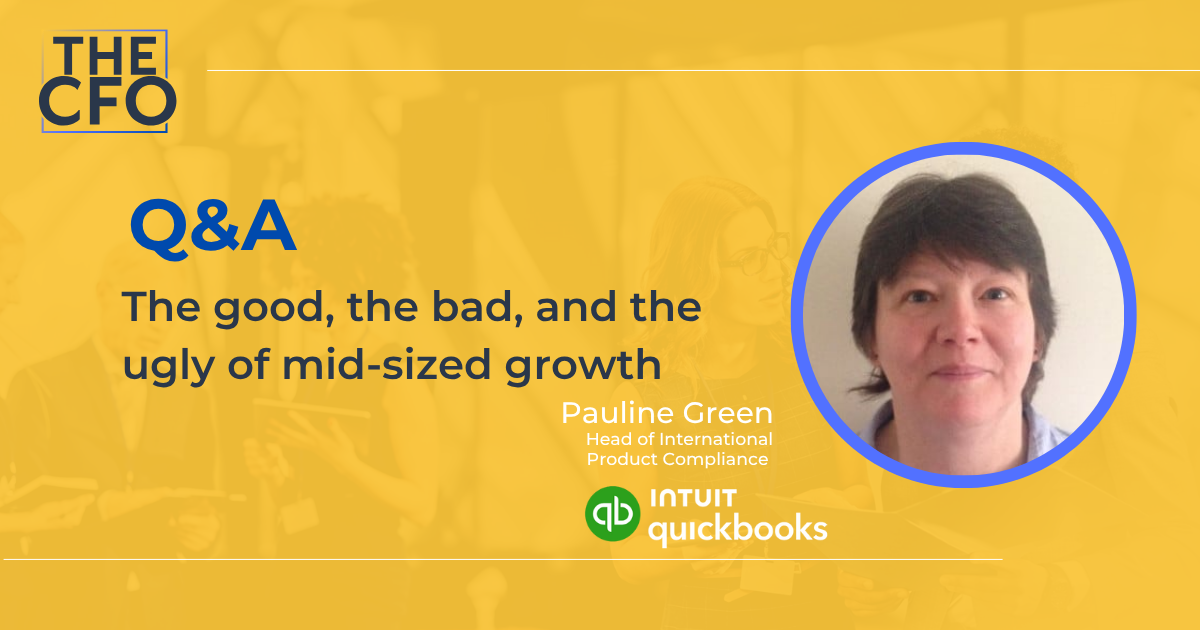Growth is exciting – until it isn’t. For mid-sized businesses, scaling up brings opportunity, but it also opens the door to errors, blind spots, and unexpected costs.
The very agility that fuels expansion can just as easily send a business off course if financial discipline slips.
Pauline Green, Head of International Product Compliance at Intuit, has seen every side of this journey. A former accountant who now shapes QuickBooks’ compliance strategy, she spends her time helping businesses avoid the pitfalls that come with growth, and spotting the warning signs before they turn ugly.
Why mistakes keep happening
The data doesn’t surprise Green. In Intuit’s survey of 4,000 senior business leaders, more than 50% admitted to making costly accounting errors.
“It’s so easy to get things wrong when different people are submitting expenses or making purchases,” she explains.
“Someone buys something from Amazon – is it office supplies, packaging, cost of goods sold? Without context, it’s easy to misclassify.”
This is where she sees AI and machine learning stepping in, not as a replacement for human oversight but as a safeguard.
“When the system can suggest a category based on past behaviour and explain why it’s making that suggestion, you reduce errors and build trust. That clarity is powerful.”
Agility versus discipline
Mid-sized firms are often praised for their agility. But can moving quickly backfire? “Absolutely,” says Green.
“Sometimes businesses jump into new trends or investments without fully understanding the financial impact. Think of the rush into crypto a few years ago – not everyone came out unscathed.”
Agility and discipline, she argues, are not opposites but partners.
“If you’re truly on top of your numbers, you can innovate while knowing when to pull back. The danger is waiting until the end of the financial year to realise you’ve been heading in the wrong direction for months.”
Cash flow: the silent killer
Among the findings that stand out, cash flow remains the most pressing issue. “You can be profitable and still run out of cash,” Green points out.
“Short-term cash visibility is critical, but so is long-term forecasting. You need to model scenarios – what if we give pay rises in August, what if we pay bonuses in December – and know how those decisions play out months ahead.”
Finance teams are usually the ones raising the alarm, but external factors make it harder.
“Forty-two per cent of mid-sized businesses rely on imports. That means exchange rates, supply chain delays, and global shocks can all hit cash flow. Even simple measures, like holding a dollar account if you trade in dollars, can hedge some of that risk.”
Where to start if you’re behind
For firms still relying on disconnected systems, Green’s advice is pragmatic: invest in software that scales with you.
“You don’t want to be switching platforms every time you grow. A system that integrates payroll, accounting, and expenses – and can grow with the business – gives you visibility without extra admin.”
She also stresses the role of accountants as partners. “If your accountant can see the same real-time data you do, they can help you plan better. That’s invaluable when you’re moving from small to medium to large.”
Bridging the gap with policymakers
Green’s role puts her at the intersection of business reality and government regulation.
“We work closely with HMRC and DWP to explain what businesses actually face. Policymakers have good intentions, but they don’t always see the operational complexity on the ground.”
She highlights upcoming mandates, like digital reporting for benefits-in-kind, as examples where real-world input matters.
“Some firms run multiple systems that don’t talk to each other. Layering on new requirements without understanding that just adds more admin — and more room for mistakes.”
Resilience, in simple terms
Asked to define financial resilience for a non-finance founder, Green is refreshingly direct: “Don’t just think about profit. Cash flow matters just as much. Set aside money for taxes, and build a buffer for the unexpected.”
She believes the upcoming shift to quarterly reporting under Making Tax Digital will help businesses stay on top of obligations. But her advice remains old-school: keep cash front of mind.
“Profits are nice, but cash is king.”
The cost of cutting corners
The current pressure to “do more with less” is familiar to every CFO, but Green warns that cutting too much can be a false economy.
“If you delay investing in the right tools or processes, you end up paying more later – in mistakes, lost time, and stress.”
She likens it to personal finance: “People don’t always check their bank accounts or payslips, and months later realise they’ve been paying for things they don’t need or on the wrong tax code. Businesses do the same at scale. Being on top of the numbers, in the moment, is what saves you.”
The advice she gives again and again
Despite years in the industry, there are two pieces of advice Green finds herself repeating. The first: don’t leave your self-assessment tax return until the last minute. “Every January, accountants are overwhelmed because clients waited too long. You can file early, get your numbers, and plan – you just don’t have to pay early.”
The second: check your payslip. “Most people glance at the net pay and assume it’s right. But mistakes happen, and it’s the employee’s job to catch them. Even I had to call HMRC three times to get a tax code fixed.”
Whether you’re an individual or a mid-sized business, staying financially resilient comes down to the same thing: know your numbers, understand them, and act before it’s too late.
